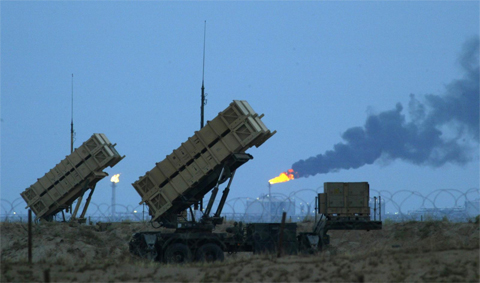Army assures own Patriots cover and protect all geographical borders
KUWAIT/WASHINGTON: A US decision to remove anti-missile systems from Kuwait and several Arab allies was an “internal and routine procedure”, Kuwait said yesterday, adding that its defenses would not be affected. A US defense official told Reuters that Washington was pulling four Patriot missile systems from Kuwait, Jordan and Bahrain in line with a Pentagon shift in focus away from the fight against Islamist militants in order to address tensions with China and Russia.
“Kuwait’s Patriot missile system, independently, protects and covers all its geographical borders,” Kuwait’s army chief of staff said in a statement. It added that the US decision had been coordinated with Kuwait’s military. Two Patriot systems, which are used to shoot down missiles and planes, will be redeployed from Kuwait, and one each from Jordan and Bahrain, the US official said. The decision was made some time ago and the removal is scheduled for next month, the official added.
The move follows rising rhetoric against Iran from the United States, which earlier this year pulled out of the 2015 deal in which Tehran agreed to curb its nuclear work in return for the lifting of most Western sanctions. “Due to operational security concerns, we’re not going to discuss the movement of specific capabilities into and out of the US Central Command area of responsibility,” a US Central Command spokesman said in a statement. The news was first reported by the Wall Street Journal. There was no immediate comment from Jordan and Bahrain did not respond immediately to a Reuters’ request for a comment.
In June this year, Britain agreed to deploy military troops in Kuwait in response to a request from the government, according to media reports. The consent followed talks of a Kuwaiti-British cooperation committee in June and a visit by Kuwait’s foreign minister to London, a source said, expecting the deployment to take place later this year. British Ambassador to Kuwait Michael Davenport said in an interview then the planned troop presence will not be large, describing defense links as a mainstay of relations between his country and Kuwait. Kuwait has also signed military agreements with Turkey and China.
Wealthy Gulf states have stepped up their defense spending amid higher tensions in the region, where Iran and Saudi Arabia are locked in a tussle for influence, backing rival forces in political struggles or wars in Lebanon, Bahrain, Syria and Yemen.
Relations between United States and Russia face a number of strains, including over Russian support for President Bashar Al-Assad in the Syrian civil war and US allegations that Russia meddled in the 2016 US presidential election. Russian denies any wrongdoing. Beijing and Washington are locked in an increasingly bitter trade war and are at odds over other issues, such as US support for self-ruled Taiwan which China claims, and US sanctions on China’s military for buying Russian weapons. - Agencies











